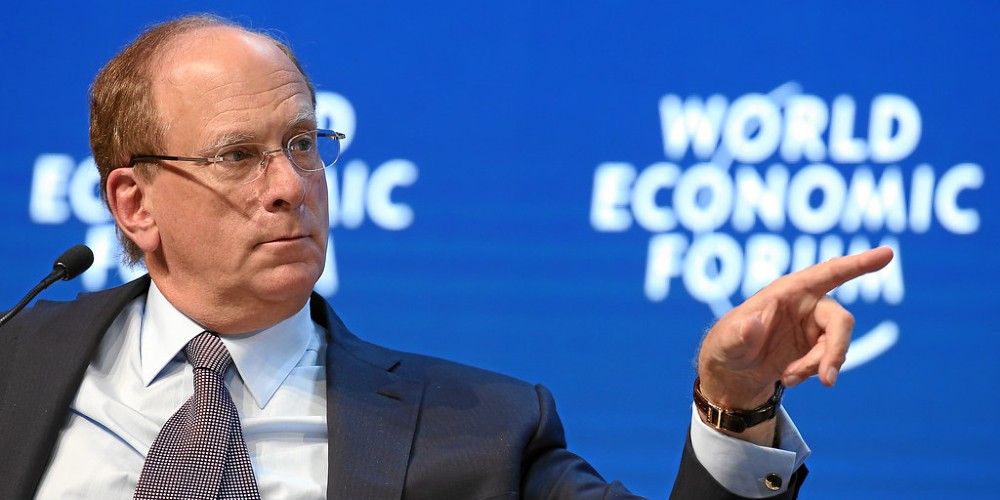BlackRock CEO Larry Fink and other executives at the company told Wall Street analysts on Friday that they are focusing on inorganic investments following the recent challenges banks across the western world have experienced since last month. This has financial prognosticators diving into their recent moves to see what it could mean for the various markets going forward.
When it comes to reading the financial tea leaves, there are three groups that smart investors look to for hints about what to expect. The first is government. Policies not only affect investments directly but also send cues to big players about which way the winds will turn. The second group is made up of central banks such as the Federal Reserve. Contrary to what they tell the public, their primary goal is to protect their own money with a distant secondary goal being to keep the economy stable.
It’s the third group that doesn’t get nearly as much attention that often gives the best clues about what’s coming down the pike. This group of mega-money managers, which is made up of corporations like Blackrock, Vanguard, and State Street, often have the most direct influence over the financial affairs of individual investors. While governments and central banks can make macro moves to affect industries or economy in general, it’s the money managers who have the most influence over companies big and small.
Moreover, they directly impact investments of individuals by making moves in their retirement portfolios.
This is why Friday’s discussion between Fink and Wall Street analysts is raising eyebrows. While many investors are concerned about the banking industry’s instability, BlackRock sees it as a huge opportunity. According to Business Insider:
Upheaval in the banking sector could create openings for growth in parts of BlackRock like cash management, the firm’s Aladdin technology business, its alternatives business, and its advisory arm, Goldman Sachs analysts led by Alex Blostein said in a note to clients on Friday.
The alternatives business, where managers offer products like private credit and private equity, has been a focus of growth. The Financial Times reported last December that BlackRock had “discussed whether to pursue a takeover of private markets manager Carlyle but decided against it,” citing three people with knowledge of those discussions.
But it isn’t what these huge financial corporations say that gets the most interest. It’s what they exclude from their discussions that often point investors toward smart money. It’s noteworthy that as Fink and others at BlackRock talked of inorganic investments in certain areas, they didn’t mention BlackRock Gold, the wing of the company tasked with investing in precious metals companies. Considering they’ve boosted investments into these companies up to 70% this year, one would think portfolios backed by physical precious metals would be worthy of a mention.
Instead, crickets. Their silence says more than any words they may have uttered.
In an interview with FOX Business, Jonathan Rose, CEO of Genesis Precious Metals, said, “Both gold and silver added 15% to 20% over the last six months, while the overall market was in the range of 2% to 4% growth.”
“Things are just starting to heat up,” he added. “In fact, the long-term projections in the precious metals market could get even higher.”
“And regardless of the Fed’s position, few Americans have faith that the U.S. dollar will strengthen, providing a strong case for allocating a portion of funds to a tangible and secure asset,” Rose added.
If BlackRock, central banks, and governments are looking toward precious metals in general and gold in particular to back their own investments, one might conclude the same for individuals with retirement and wealth to protect.
What Would You Do If Pharmacies Couldn’t Provide You With Crucial Medications or Antibiotics?
The medication supply chain from China and India is more fragile than ever since Covid. The US is not equipped to handle our pharmaceutical needs. We’ve already seen shortages with antibiotics and other medications in recent months and pharmaceutical challenges are becoming more frequent today.
Our partners at Jase Medical offer a simple solution for Americans to be prepared in case things go south. Their “Jase Case” gives Americans emergency antibiotics they can store away while their “Jase Daily” offers a wide array of prescription drugs to treat the ailments most common to Americans.
They do this through a process that embraces medical freedom. Their secure online form allows board-certified physicians to prescribe the needed drugs. They are then delivered directly to the customer from their pharmacy network. The physicians are available to answer treatment related questions.


